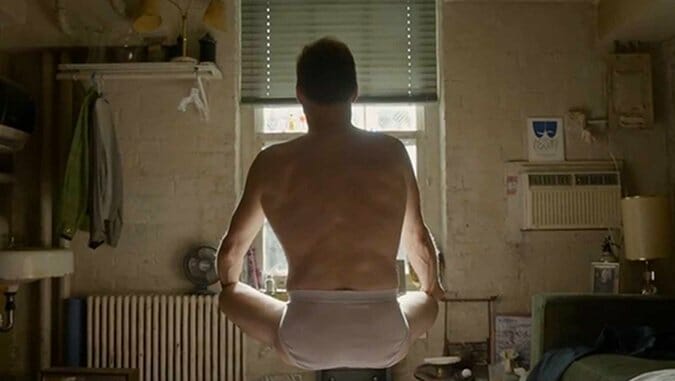Birdman

Riggan Thomson (Michael Keaton) used to be somebody. Specifically, he used to be Birdman, a once globally beloved superhero turned pathetic pop culture footnote 20 years after his relevance (and his fortune) has faded. He used to soar above the world, patrolling the skies on wings of justice, dispensing law and order to all evildoers who would threaten the sanctity of his concrete roost. But now, Thomson is washed up. When his name receives mention, it’s enunciated with notes of incredulity and pity. Thompson influenced an entire niche of blockbusters; now, decades later, the poor sap just isn’t important anymore.
The story of Thomson’s legend squandered is Mexican director Alejandro González Iñárritu’s Birdman, a movie about the rigors of celebrity; the transience of fame; the utter horseshit fakery of the drama world; artistic sacrifice; fatherhood; and about a million other themes all rolled into one fluid two-hour package. If you’ve read anything about Birdman to date, then you’ve probably heard about its big feat of technical wizardry: the film is photographed and assembled to look like one long, uninterrupted take. Iñárritu’s lens moves from dressing rooms to the stage, from the stage to the street and from the street all the way to rooftops, eventually taking flight itself and majestically gliding over the dense, clamorous backdrop of New York City.
It’s a trick, of course. Even viewers who aren’t versed in spotting an editor’s fingerprints will likely be able to guess where Birdman cuts, where one segment ends and another begins. (Some, like a long shot of the metropolis’s skyline, in which evening gives way to morning, are more obvious than others.) It matters little; Iñárritu doesn’t have any pretensions toward fooling us, and the experience still feels seamless. More than that, it’s a rush. Movies don’t tend to move with Birdman’s swaggering brio, but Iñárritu isn’t making a movie as much as he’s playing with jazz-like structures (and the constant drumming soundtrack suggests as much), building themes through manic passages that are somewhere between improvisation and a kind of brilliant synergy amongst its interlocking parts. His method here is flashy no doubt, the work of a showman pushing himself with the threat of spectacle, but gimmick or not it works. The picture, really, wouldn’t be the same without it (which is more of a statement of fact than criticism).
Birdman unfolds over several days as the aforementioned Thomson scurries about, trying to get his play—an adaptation of Raymond Carver’s short story “What We Talk About When We Talk About Love”—together in time for its Broadway premiere. The man is a deep-fried mess, beset on all sides by problems both professional and personal. He has to replace his male co-lead with Mike Shiner (Edward Norton), a bumptious method actor romantically entangled with Lesley (Naomi Watts), herself a bundle of nerves and a Broadway debutante-to-be; he keeps brushing off his daughter, Sam (Emma Stone), who is also his assistant; his producer and best friend, Jake (Zach Galifianakis), is buckling under the pressure of his responsibilities; the New York Times’ critic, Tabitha (Lindsey Duncan), is baying for his blood; and his girlfriend, Laura (Andrea Riseborough), is pregnant, which would be a source of joy if Thomson was remotely in a good place to raise another kid.
-

-

-

-

-

-

-

-

-

-

-

-

-

-

-

-

-

-

-

-

-

-

-

-

-

-

-

-

-

-

-

-

-

-

-

-

-

-

-

-








































